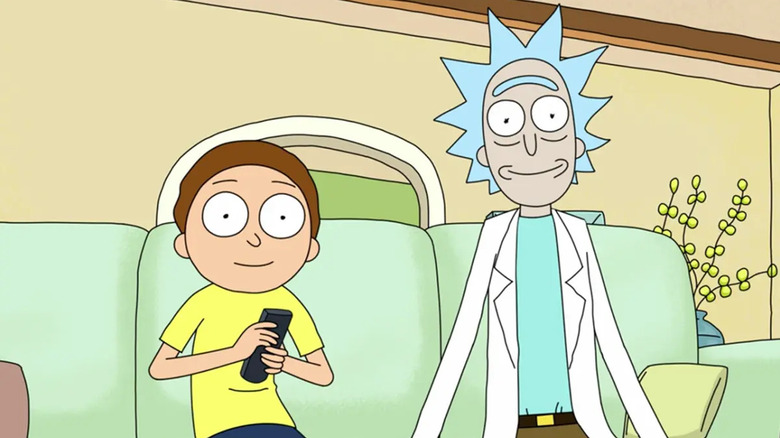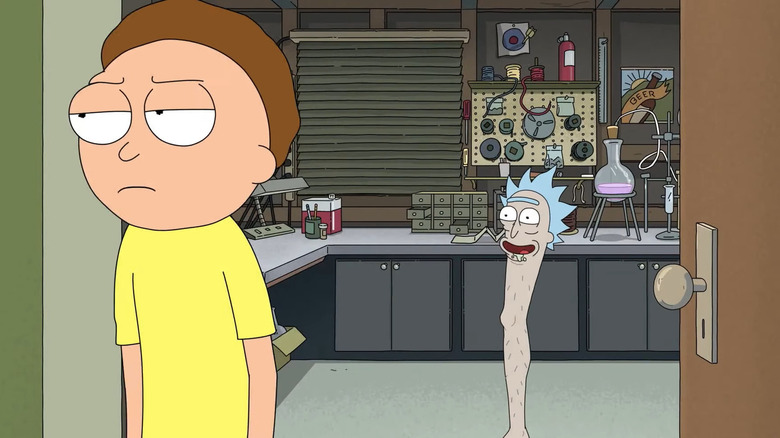The Simpsons Writers' Room Had An Important Rule In Place About Repetition [Exclusive]
Most of the staff writers at "Rick and Morty" got their start writing for a different TV show. Cody Ziglar, a writer for season 7 who spoke to /Film in a Zoom interview, had written for shows like "Robot Chicken" and "She-Hulk" before writing for the 2023 revival of "Futurama." It was in the "Futurama" writers' room where he heard some advice from David X. Cohen, the "Futurama" co-creator who had gotten his start on "The Simpsons." As Ziglar explained:
"'Futurama' is even wilder [than 'Rick and Morty'], because the show's been on for so long. 20 plus years, off and on. But David would always tell this funny anecdote. David would always come on the show, and always tell this funny anecdote about how, for 'The Simpsons,' they had this rule. For 'The Simpsons,' they could only tell the same story three times. And he was like, 'Well, we [the 'Futurama' staff] haven't gotten that far yet, but we could tell versions of the same story.'"
It's an anecdote that mostly checks out, depending on what you consider to be "the same story." There are a lot of "Simpsons" episodes where Sideshow Bob escapes prison and tries to kill Bart, for instance, but you could argue that the dynamics are altered enough each time to steer clear of this rule. After all, out of all the Sideshow Bob episodes in the series, surprisingly few of them revolve around Bob trying to kill Bart specifically.
Perhaps the clearest example of this rule on "The Simpsons" was with Homer's mother, Mona (Glenn Close). She was there for the first "Homer reunites with his mom" storyline in season 7's "Mother Simpson." The show repeats a lot of the same narrative beats in season 15's "My Mother the Carjacker," right down to the part where Mona has to go back on the run at the end. Season 19's "Mona Leaves-a" starts off like another sequel to "Mother Simpson," but it comes with the early twist of Mona dying, cutting off the ability for any more "Mona returns" storylines from that point forward.
Rick and Morty has been spared from following this rule so far
It's a testament to how creative "The Simpsons" is that, even after 36 seasons of the series, it's hard to find any clear-cut examples of the show breaking this rule. Memorable one-off characters (like Bleeding Gums Murphy or Lurleen Lumpkin) only return for major storylines one or two times before the show decides they've done enough with them. Even episode types you've think the show's done a million times before (like the classic "Homer and Marge face a marriage crisis" template) are varied enough in scope and tone that they rarely count as telling the same story.
"Rick and Morty" has fewer episodes under its belt so far, which means there's less danger of it repeating itself too much. Even still, the writers' reluctance to revisit the same concepts is shown through the show's treatment of its anthology episodes. After both season 1 and 2 featured an Interdimensional Cable premise, fans figured this would be the show's equivalent to the "Treehouse of Horror" anthology specials on "The Simpsons." But the "Rick and Morty" writers switched things up and made their season 3 anthology episode a clip-show spoof, which they'd do again in season 7.
In season 4, "Rick and Morty" did an ultra-meta concept for its anthology special, which it repeated in season 6. Forget the rule of not going past three episodes — "Rick and Morty" seems unwilling at this point to revisit the same premise more than twice. It's a little disappointing to the fans who still consider Interdimensional Cable to be one of the funniest concepts of the series, but I give props to the writing staff for showing some restraint.
"Futurama," despite its larger episode count, is in a similar boat as "Rick and Morty." It definitely has its sequel episodes, like the floating brain aliens attacking Earth in two separate outings, but it's seemed content to cut off a premise after the second or third try.
The difference between writing for Futurama and Rick and Morty, according to Ziglar
When asked about the difference between writing for the "Futurama" revival and writing for "Rick and Morty" season 7, Cody Ziglar offered his take:
"There's a lot more independence on 'Rick and Morty,' where you just kind of go off and write your script. [...] But with 'Futurama,' it definitely is more regimented [...] We all bring it in the room together. We all punch it up together. It truly is all hands on deck from beginning to end, and the script writers really just going off to add a little bit of flavoring. But it truly is, 'There's no I in team' for 'Futurama,' [and] I really, really, really enjoy that."
It's an approach you can definitely feel when watching both series. The "Futurama" revival has had a consistent tone each week; some episodes are better than others, but it never feels like a story idea came out of nowhere, nor do the jokes ever surprise viewers too much with their style or range.
Meanwhile, there are a lot of "Rick and Morty" episodes that feel like their own special thing, for better or worse. Season 7 episodes like "Fear No Mort" and "Rise of the Numbericons: The Movie" have different writers, and you can feel that through their vastly different tones and styles. As Ziglar put it, "You really get to see what makes that particular writer happy, or what makes their sense of humor."


